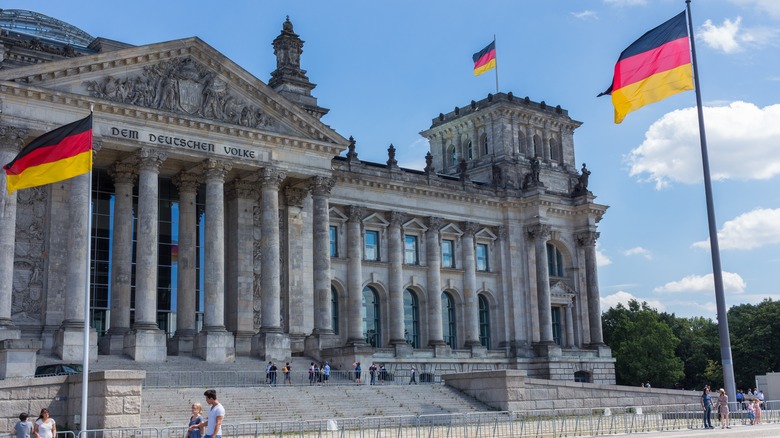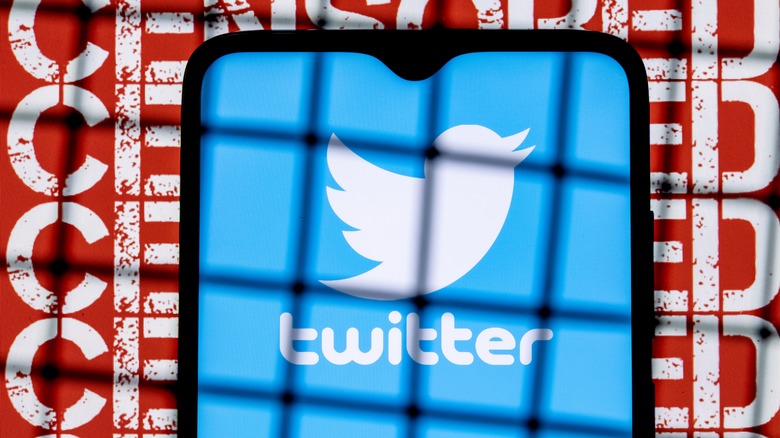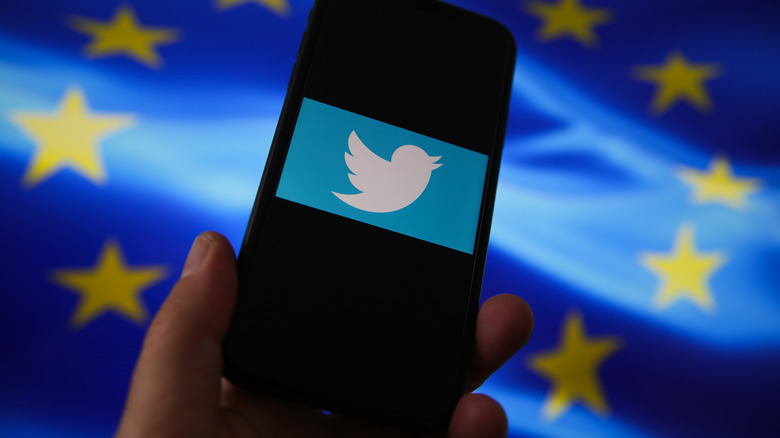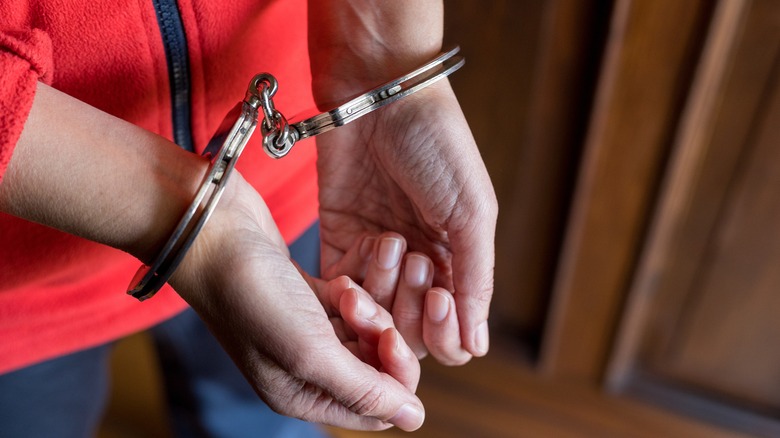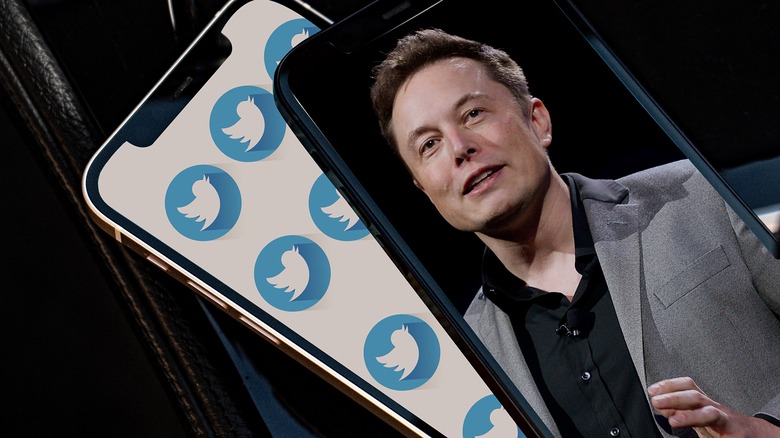Why Germany Could Be Elon Musk's Biggest Twitter Headache
Elon Musk's takeover of Twitter was a long, complex, and drawn-out affair which included months of negotiations, a legal battle, and some very public arguments involving memes. While you could argue the hard part is over, and Musk is now free to do what he wants with the platform, in reality things are a lot more complicated than that.
After spending $44 billion on Twitter, Musk has wasted no time putting his stamp on the company. Within hours of the takeover being confirmed, several high level executives were fired, and plans were put in place to lay off large numbers of Twitter's workforce. One of the bigger items on Musk's to-do list, and part of the reason his acquisition of the social media network was so contentious, is his promise to turn Twitter into a "free speech platform." Supporters agree with Musk's claims that the world needs a "digital town square" where ideas and opinions can be shared without fear of censorship. However, detractors believe loosening restrictions on speech currently allowed by Twitter's terms of service will lead to the platform becoming a hotbed of misinformation, abusiveness, and extremist political views.
On several occasions, Musk has said restrictions on speech should align with laws implemented by democratic governments. Back in April Musk tweeted: By "free speech", I simply mean that which matches the law. I am against censorship that goes far beyond the law. If people want less free speech, they will ask the government to pass laws to that effect." The problem is, Twitter is an international company and different countries place different restrictions on speech. While the first amendment can prevent people in the U.S. being prosecuted for what they say, other countries have far tighter restrictions.
Germany is a potential roadblock for Musk's plans
Free speech isn't actually that common a concept. At the extreme end, some countries will execute people for saying or writing things that deemed treasonous against the nation's dominant religion or critical of the regime in power. In the Western world, the death penalty is uncommon, and people aren't executed for saying the wrong thing. However, people can still go to jail, and companies can be both fined or banned from operating within certain nations.
Germany has some of the most restrictive speech laws in Europe, most of which were put in place following World War II when a failed Austrian painter took the concept a bit too far, stripped the right from everyone who disagreed with him, committed a number of genocides, invaded most of Germany's neighbors, and very nearly destroyed the entire world. As a result, mention of "Naziism" and anything remotely like it will result in the German Police paying you a visit. This includes certain symbols, which is why Germany gets its own version of World War II-themed games like Wolfenstein. It is also why German Twitter is its own ecosystem.
A German law passed in 2018 forces social media companies to promptly remove anything that could be considered "hateful content." Twitter users who set their location to Germany won't see the same tweets users based in other locations get, as an algorithm blocks those tweets out. If Twitter doesn't remove clearly hateful content, or at least stop it from being visible in Germany, within 24 hours of it being flagged the company can be fined up to €50 million (via CNBC).
Germany is unlikely to budge on these laws, so Musk hasn't got much of a chance of bringing his "free speech" concept to the country.
The rest of Europe could cause Musk issues too
Article ten of the European Charter of Fundamental Rights guarantees freedom of thought, conscience, and religion while article 11 specifically mentions a right to "Freedom of expression and information." Article 13 of the charter also includes the right to artistic expression and academic freedom. So on paper, European citizens have pretty extensive protections when it comes to free speech. However, in reality, other laws — both E.U.-wide, and national laws like those in Germany — mean not everything falls under the banner of "free speech," and certain statements will land you or the company that published them in legal trouble.
One European Union politician, Commissioner for the Internal Market of the EU, Thierry Breton, issued a response to Musk's "the bird is free" tweet that said "In Europe, the bird will fly by our rules." The rules Breton is referring to are likely part of the recently passed and soon to be implemented Digital Services Act (DSA). Most of the regulation the DSA will eventually put into place involve things like online transactions and misinformation. There is however a section designed to limit the spread of "misinformation," which could force Twitter to take down certain types of tweet and restrict certain users. If Musk's latest acquisition doesn't comply in 2024, large fines will be issued, and the company may even be banned from operating in Europe. Musk is also on video agreeing with Breton, and the DSA itself, which may give an indication of where Twitter will ultimately draw the line on free speech.
Twitter users could also face legal consequences
While many laws may result in Twitter facing legal consequences, the platform's users could also be prosecuted for what they say — even if it doesn't breach whatever rules Twitter eventually lays out. Across the English Channel from Europe is Britain, which also has a complex relationship with free speech. Like with Europe, freedom of expression is codified. However, it is also dulled by numerous laws relating to causing offense, inciting hatred, and the use of electronic communications devices.
The Communications Act is a good example of this kind of legislation. Section 127 of the act contains some pretty vague wording that opens up electronic communications of a "grossly offensive or of an indecent, obscene or menacing character" to prosecution. Electronic communications can include anything from phone calls to YouTube comments, and based on past convictions, it's easy to see tweets certainly fall under that umbrella. The consequences of posting offensive tweets in Britain can range from police cautions, to fines, to actual jail time. Many of the more high-profile cases have involved the use of racist language, but that isn't always the case. A person who made offensive comments about Captain Tom Moore, a 100-year-old veteran who raised money for Britain's health service by walking laps of his garden during the coronavirus pandemic, was also arrested and prosecuted under the act. The lines for prosecution are blurred, and as a UK-based tech lawyer told The Verge, an individual can still be prosecuted for sending an "offensive tweet" even if the person the tweet was aimed at was not "offended" by it.
Musk has already promised some restrictions
Shortly before he took over, Musk released an open letter to the platform's advertisers. The letter, which seems to be an attempt to quell some of the fears surrounding his plans for the platform, contained an acknowledgement that Twitter will not become "a free-for-all hellscape, where anything can be said with no consequences." The letter also repeated Musk's belief that legal restrictions to free speech are valid and should be used in defining where the line is. Another sentiment that showed up again in Musk's open letter was the idea that Twitter could include multiple modes that allow users to see different kinds of content. The analogy Musk goes back to is the age rating system that is used for movies and video games. The system allows users to avoid violent, sexual, or offensive content if they want while still giving other people the option of engaging with it.
The "multiple modes" model would also allow Twitter to align its policies with the web of international laws the company has to navigate. This is already happening with Germany, where things are likely to remain the same. Similar ecosystems could be created for other countries that have laws more restrictive than the rules the platform's moderation panel ends up suggesting. The chances are it won't work perfectly. Banned content still shows up on German Twitter, and even when it is flagged the content may be up for hours or even days before it is eventually removed. But the modular approach is probably the only way Twitter can fit Musk's goals while keeping in line with various laws and not alienating a large section of its user base.
